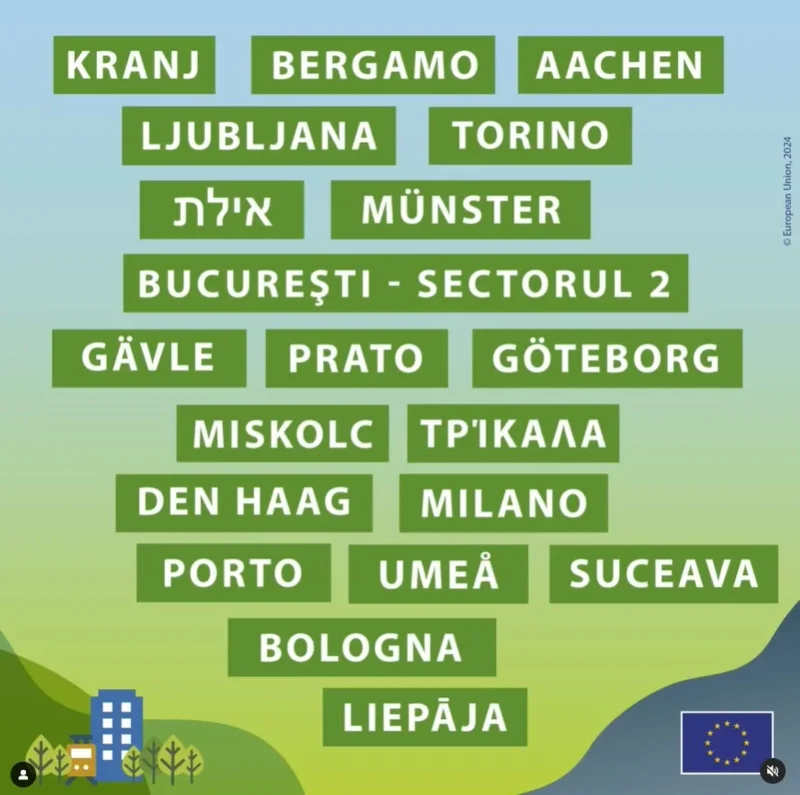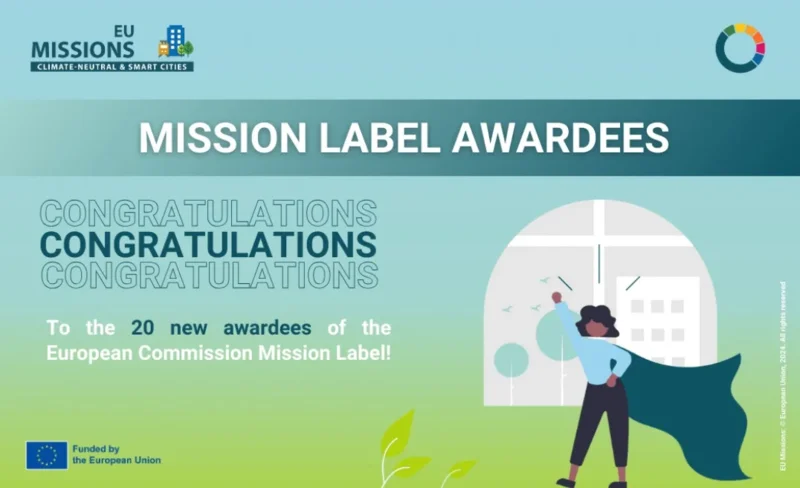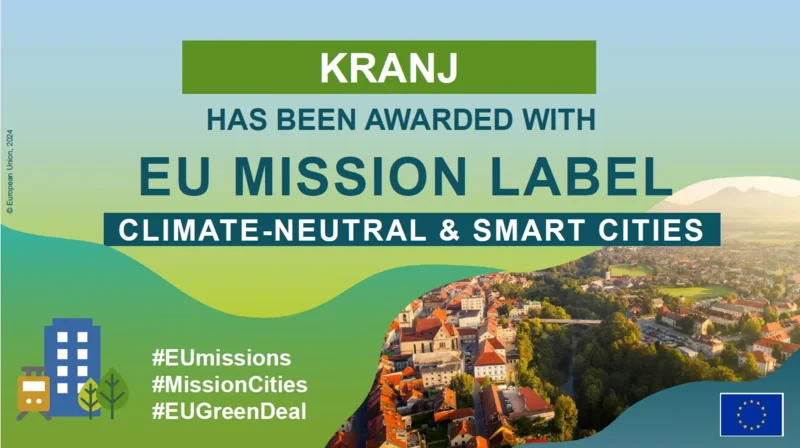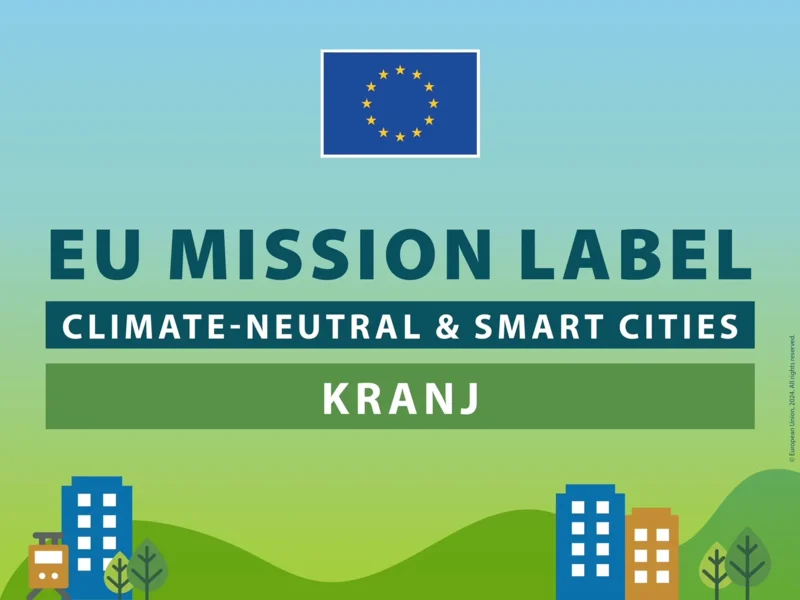Kranj has been awarded with EU Mission Label
The European Commission today revealed that Kranj is among the recipients of an award for having successfully prepared and, above all, implemented an action and investment plan to become a climate-neutral and smart city by 2030. The award ceremony will take place on 22 October this year in Strasbourg, and Kranj joins 33 cities that have already received the 'EU Mission Label' in the past year, along with 20 other cities that submitted their climate treaties for review in March.
Kranj, selected in 2022 for the Mission for Climate Neutral and Smart European Cities 2030, one of the EU's missions under the Horizon Europe programme, was the first Slovenian city to officially submit a Climate City Contract (CCC) for review in Brussels on 13 March 2024. This complex document, which has three parts - an action plan, an investment plan and a commitment from the project partners - was submitted by 23 cities by the March deadline; only ten, including Kranj, met all the criteria after the first review by the NetZeroCities consortium, while the others were invited to make additions or corrections. The documents were then scrutinised by the European Commission and 20 cities were awarded the Mission Label, with Kranj scoring all possible points.
 |
 |
This puts it in the top 50 cities whose climate treaty has been given the green light - 100 EU cities and 12 cities from countries linked to the EU's research and innovation programme (Horizon Europe) are participating in the Mission, while 377 cities, including eight Slovenian cities, have applied to participate in the European Commission's call for proposals for the 2021 Mission, but only Kranj, Ljubljana and Velenje have succeeded.
The EU Mission label is an important milestone for the future action of cities. It not only signifies that a city has successfully set out a vision to achieve climate neutrality, but also opens up pathways and facilitates access to public and private funding to achieve this goal, and ensures the EU's continued support for a city's efforts to translate ambitious plans into projects.
"An extremely clear and comprehensive action plan, a very clear methodology for the city's emissions inventory, detailed explanations for all the strategies and the conclusion that all together show a thorough understanding of the climate challenge and a strong commitment by Kranj to climate neutrality - all these and more positive things were noted by the European Commission in its assessment of our climate city contract. We can be genuinely proud of this recognition. We have prepared the documents practically without error, in cooperation with citizens, public institutions and other (local) organisations, experts, and also with the business community. We intend to continue this inclusive and cohesive approach in the future - from plans to implementation. Thank you in advance for continuing to help us on the road to a better tomorrow," said Matjaž Rakovec, Mayor of CoK.
Iliana Ivanova, Commissioner for Innovation, Research, Culture, Education and Youth, said: “The EU Mission Label celebrates the bold steps these 20 cities are taking towards climate neutrality. Their commitment paves the way for a sustainable and resilient future for all our communities. The Commission will continue supporting them on this journey."

Six actions almost to the target
The cities in the mission aim to significantly reduce their greenhouse gas emissions compared to 2018; for Kranj, this means 113,263 tonnes of CO2 equivalent less than in the base year by 2030. The Kranj Action Plan foresees six main actions in five key areas: energy, transport, waste and circular economy, green and blue infrastructure and buildings (built environment).
The main actions envisaged are: (1) setting up solar power plants and energy storage systems on the roofs of municipal and state-owned buildings, and encouraging the owners of individual buildings to do the same, while also setting up energy cooperatives so that citizens living in multi-apartment neighbourhoods or with inadequate roofs can also have access to green energy; (2) one car per household, which means 8000 fewer cars in Kranj; (3) the establishment of district heating/cooling (with renewable energy sources); (4) the establishment of the Zarta Circular Economy Centre for smart waste management; (5) the establishment of infrastructure for e- and hydrogen vehicles; (6) the exploitation of waste heat from industrial and commercial buildings. The energy measures in Kranj are expected to reduce greenhouse gases by 41%, transport by 32% and waste management and the circular economy by 13%.
Then there are other measures such as car-free zones, the introduction of one-way streets, the renewal of railway lines and a smart multimodal public transport system (central passenger terminal for bus and rail transport with a KRsKOLESOM station), carbon-neutral buildings and smart solutions will make a significant contribution to the targets. The latter, in particular for rational action planning (based on the analysis of city and environmental data) and thus better city management, for up-to-date communication with citizens, for educational/awareness-raising content, for planning sustainable routes, for easier and faster access to city services through the city card system and the city digital platform available to citizens in the form of the Smart Kranj mobile app.
According to the investment plan, more than €360 million will be needed to implement the planned measures. However, some of the measures have already been implemented in the MOC since 2018 - for example energy renovations of public buildings, solar power on roofs, e-vehicle park, waste management, etc. - so this amount is lower by at least €62 million. In addition, it will be divided in a manageable way between the municipality (€96 million), the citizens (€102 million), the infrastructure managers (€44 million), the economy or private sector (€72 million) and the State (€52 million). As far as the citizens' investments are concerned, we are mainly talking about the energy renovation of their homes, renewable heating, solar power plants, the purchase of e-vehicles, etc.
The European Commission press release is available here.
Background
Cities account for more than 70% of global CO₂ emissions and consume over 65% of the world's energy. The EU Cities Mission aims to help European cities become climate-neutral by 2030, offering cleaner air, safer transport and less congestion and noise to their citizens. The Mission also contributes more broadly to the EU goal of reaching climate neutrality by 2050 and the upcoming Clean Industrial Deal announced by Commission President Ursula von der Leyen.
The following cities have received a label in previous rounds: The first batch in October 2023: Sønderborg (Denmark), Mannheim (Germany), Madrid, Valencia, Valladolid, Vitoria-Gasteiz and Zaragoza (Spain), Klagenfurt (Austria), Cluj-Napoca (Romania) and Stockholm (Sweden) and the second batch in March 2024 with Ioannina, Kalamata, Kozani, Thessaloniki (Greece), Heidelberg (Germany), Leuven (Belgium), Espoo, Lahti, Lappeenranta, Tampere, Turku (Finland), Barcelona, Seville (Spain), Pecs (Hungary), Malmö (Sweden), Guimaraes, Lisbon (Portugal), Florence, Parma (Italy), Marseille, Lyon (France), Limassol (Cyprus) and Izmir (Türkiye).
The 20 cities that received the label today are: Aachen, Münster (Germany), Trikala (Greece), Miskolc (Hungary), Eilat (Israel), Bologna, Bergamo, Milan, Prato, Turin (Italy), Liepāja (Latvia), The Hague (the Netherlands), Porto (Portugal), Bucharest 2nd District, Suceava (Romania), Ljubljana, Kranj (Slovenia), Gothenburg, Gävle, Umeå (Sweden).
